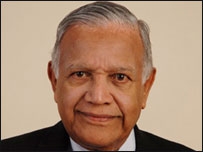JUDGE CHRISTOPHER WEERAMANTRY
AWARDED HIGH AWARD
FOR HIS SERVICE FOR LAW
By Walter Jayawardhana

Former International Court Justice Christopher Weeramantry has been
awarded “The Right livelifhood Prize for peace and Environment"
.
Sri Lankan legal scholar and former Supreme Court Judge Christopher
Weermantry , a former vice president of the International Court of Justice,
was given the prize for his efforts to 'strengthen and expand the rule
of international law', the award citation said. The awards will be presented
in a ceremony at the Swedish Parliament on Dec. 7.
The Swedish institute that makes the annual awards to four individuals
said, “The Right Livelihood Award was established in 1980 to honour
and support those offering practical and exemplary answers to the most
urgent challenges facing us today. It has become widely known as the
'Alternative Nobel Prize' and there are now 128 Laureates from 56 countries.”
The founder of The Right Livelihood prize for peace and environment
is Jacob von Uexkull who was a former member of the European Parliament.
According to an announcement made last Tuesday ,two others from Kenya
and Canada and a Bangladeshi solar electrification scheme have been
selected for this year’s four awards. The Company known as Grameen
Shakthi has been promoting solar energy among rural households in Bangladesh.
The awards also have been given to Percy and Louise Schmeiser of Canada
for their courage in defending biodiversity and farmers’ rights
and Dekha Ibrahim Abdi from Kenya for her “effective peace work
and conflict resolution" in many divided countries”.
Christopher Weeramantry, who lives in Colombo was also Australia’s
Monash University Law Professor before he became a judge of the International
Court of justice in the Hague. An avowed patriot of Sri Lanka he called
the invasion of the Sri lankan airspace by a fleet of Indian air force
transports, escorted by jet fighters, to drop what they called 25 tons
of "humanitarian" supplies to LTTE-controlled areas in 1987
a blatant violation of international law.
Dr. Weeramantry’s professional career began in Ceylon in the late
1940s when he became an advocate in Colombo, practising law across a
wide range of types of cases. After seventeen years as a lawyer he became
a judge, and then in 1967 a Justice of the Supreme Court of Sri Lanka.
In 1972 he became a professor, moving to Australia to take up the Sir
Hayden Starke chair of law at Monash University in Melbourne.
He held that chair for nineteen years, during which time he also had
a consultancy practice as a barrister in Victoria. In 1991 he became
a Judge at the International Court of Justice, serving for a time as
Vice-President of the Court. He has only recently retired as a judge
at the International Court. Throughout the course of his distinguished
legal and academic career, in three different countries, he has produced
many important publications, publications which have made distinguished
contributions in a number of different fields.
He has published over twenty books. Judge Weeramantry’s recent
trilogy is entitled Justice Without Frontiers;and the first volume was
called Furthering Human Rights; the second The Protection of Human Rights
in the Age of Technology, and the third Extending the Canopy of International
Law.
Judge Weeramantry obtained his LLB from the University of London and
later obtained a BA in history and in 1968 a LLD degree from the same
university.
His citation for the award said: “Weeramantry is still extraordinarily
active, travelling widely all over the world to give keynote speeches
at major conferences. A book published in association with McGill University's
Centre for International Sustainable Development is called Sustainable
Justice: Reconciling Economic, Social and Environmental Law, and charts
how the concept of sustainable development is becoming important in
international law.
His book Armageddon or Brave New World: Reflections on the Hostilities
in Iraq (2003) was one of the first books to appear on the legal implications
of the Iraq War. In this book, Weeramantry makes a very powerful case
that humanity will either step back from the error of the Iraq War and
reaffirm the essential importance of the UN and the rule of international
law, or it will slide into further unilateral wars, and, ultimately,
nuclear catastrophe. A second edition was published in 2005.”
|